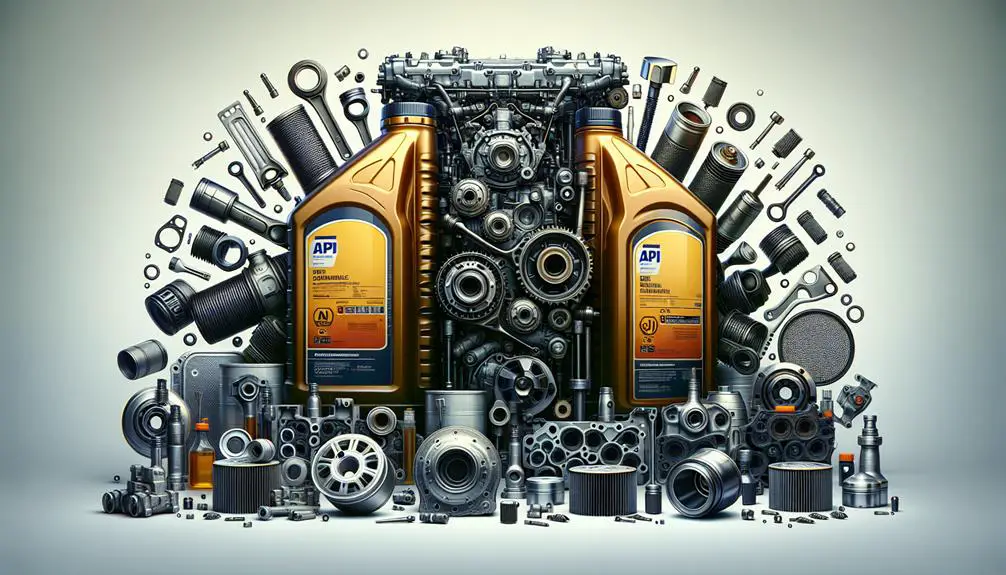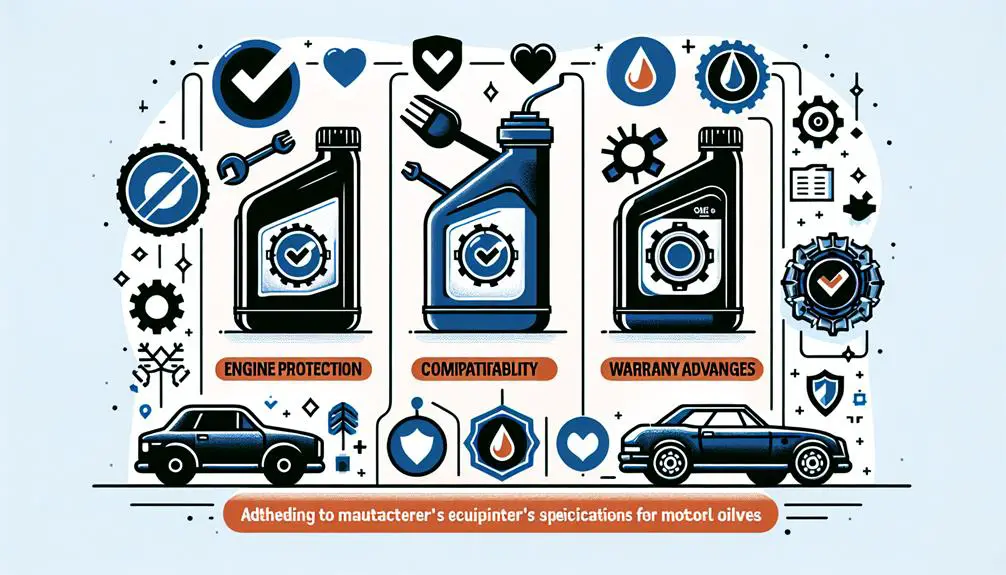Imagine your car engine as a well-oiled machine, where every component functions harmoniously. But how do you guarantee this smooth operation? API and manufacturer specifications play a critical role in maintaining this intricate balance. By understanding why API and manufacturer specs are important for motor oil, you will discover the key to peak engine performance and longevity.
Key Takeaways
- API sets quality standards for oil.
- Manufacturer specs ensure proper lubrication.
- Adherence to specs enhances fuel efficiency.
- Choosing right oil extends engine life.
- Compliance maximizes engine efficiency.
Importance of API Certification

Understanding the significance of API certification is crucial when selecting motor oil for your vehicle. API, or the American Petroleum Institute, sets the standards for motor oil quality and performance. By looking for the API certification symbol on the oil container, you guarantee that the oil meets the API's rigorous requirements.
This certification assures that the oil has been tested and approved for use in various engines, providing you with the confidence that you're using a high-quality product.
API certification frees you from the worry of substandard oil damaging your engine. It indicates that the oil has undergone thorough testing to ensure it meets the necessary standards for performance and protection. By choosing API-certified oil, you're investing in the longevity and efficiency of your vehicle's engine.
Significance of Manufacturer Specs
You should pay attention to manufacturer specifications because they provide clarity on the requirements for your vehicle. Following these specs guarantees that the motor oil you choose is compatible with your car's engine, preventing any potential issues.
Adhering to the performance standards outlined by the manufacturer ensures peak functioning of your vehicle.
Manufacturer's Requirements Clarity
For important guidance on the specifications set by manufacturers, referencing their requirements is essential. Manufacturers provide specific guidelines for motor oil to guarantee peak performance and longevity of your vehicle. By understanding these requirements, you empower yourself to make informed decisions when choosing the right oil for your engine.
Manufacturer specifications outline vital details such as viscosity grades, additives, and performance standards that align with your vehicle's needs. Ignoring or deviating from these requirements could lead to subpar performance, increased wear and tear, and potential engine damage.
To avoid these issues, always refer to the manufacturer's recommendations when selecting motor oil.
Compatibility Assurance for Vehicles
Manufacturer specifications play an important role in guaranteeing the compatibility of motor oil with your vehicle. When choosing motor oil, it's essential to refer to your vehicle's manual or the manufacturer's recommendations to confirm the oil matches your engine's requirements. Here's a breakdown of why this is significant:
| Compatibility Assurance | Importance |
|---|---|
| Engine Protection | Ensures the oil provides sufficient lubrication and protection for your engine. |
| Emission Control | Helps maintain peak emission levels and keeps your vehicle eco-friendly. |
| Fuel Efficiency | Proper oil selection can enhance fuel efficiency and save you money in the long run. |
| Longevity of Parts | Using the right oil can extend the life of engine components, reducing maintenance costs. |
| Warranty Compliance | Ensures that you meet the manufacturer's requirements, preserving your warranty. |
Performance Standards Adherence
Checking that the motor oil you select adheres to the performance standards outlined by the manufacturer is essential for ensuring peak engine function and longevity.
Manufacturers design their engines with specific requirements in mind, and using motor oil that meets these standards is important for best performance.
When you choose motor oil that aligns with the manufacturer's specifications, you're ensuring that your engine operates at its best, reducing wear and tear, and maximizing efficiency.
Understanding API Classification

Understanding API Classification can help you choose the right motor oil for your vehicle. The American Petroleum Institute (API) has established a set of standards that oils must meet to guarantee they provide adequate protection for your engine.
These standards are denoted by a two-letter code, such as SN or CJ. By looking at the API classification on the oil bottle, you can quickly determine if it meets the criteria for your vehicle.
API classifications evolve as new technologies and engine requirements emerge. For instance, oils with the SN classification are designed for modern gasoline engines, offering improved protection against sludge and deposits.
On the other hand, diesel engines may require oils with the CK-4 classification to ensure proper performance and longevity.
Decoding Viscosity Ratings
To guarantee you select the right motor oil for your vehicle, it's important to understand how to decode viscosity ratings. Viscosity ratings indicate the oil's thickness and its ability to flow in different temperatures.
The Society of Automotive Engineers (SAE) developed a numerical code to represent viscosity, like 5W-30 or 10W-40, where the number before the 'W' indicates the oil's flow in cold temperatures, while the number after the 'W' represents its flow at operating temperatures.
Lower numbers before the 'W' indicate better cold-weather performance, making it easier for your engine to start in winter. On the other hand, higher numbers after the 'W' provide better protection at high temperatures.
Understanding viscosity ratings will help you choose the right oil to keep your engine running smoothly and efficiently, ensuring peak performance and longevity for your vehicle.
Benefits of OEM Approvals

By seeking motor oils with OEM approvals, you guarantee compatibility and adherence to your vehicle manufacturer's specific requirements. This means that the oil has been tested and approved by the original equipment manufacturer for use in your particular vehicle model. Choosing an oil with OEM approvals ensures that it meets the high standards set by the manufacturer, providing you with peace of mind and confidence in the product's quality.
OEM-approved oils are formulated to work seamlessly with your engine, maximizing performance and efficiency. Using an oil that has been specifically approved for your vehicle can help prolong engine life, improve fuel economy, and maintain top-notch engine performance.
Additionally, sticking to oils with OEM approvals can also help preserve your vehicle's warranty coverage, as using non-approved oils may void certain warranty provisions. In essence, opting for motor oils with OEM approvals empowers you to make informed decisions that align with your vehicle's needs, ultimately contributing to a smoother and more reliable driving experience.
Impact on Engine Performance
When selecting motor oil, it's essential to take into account its impact on your engine performance. Using the right oil can enhance engine efficiency, improving overall performance.
However, using the wrong oil can pose risks of performance degradation and potentially harm your engine.
Engine Efficiency Enhancement
Improving engine efficiency enhances overall performance by optimizing fuel consumption and power output. When you focus on enhancing engine efficiency, you not only boost your vehicle's performance but also contribute to a greener environment. Here's why engine efficiency enhancement matters:
- Increased Power: By improving engine efficiency, you can maximize more power from your engine without compromising fuel economy.
- Enhanced Fuel Economy: Optimizing engine efficiency means getting more out of every drop of fuel, saving you money at the pump.
- Reduced Emissions: A more efficient engine produces fewer emissions, helping you reduce your carbon footprint and protect the planet.
- Extended Engine Life: Efficient engines experience less wear and tear, leading to a longer lifespan for your vehicle's powertrain components.
Performance Degradation Risks
Enhancing engine efficiency is key to maintaining peak performance, but neglecting to address performance degradation risks can greatly impact your engine's overall functionality. Over time, factors like heat, contaminants, and engine wear can lead to a decrease in your engine's performance.
Using motor oil that doesn't meet the required API and manufacturer specifications can exacerbate these risks, causing issues such as reduced fuel economy, decreased horsepower, and even potential engine damage.
Failure to adhere to the recommended motor oil standards can result in inadequate lubrication, leading to increased friction and heat within the engine components. This can accelerate wear and tear on critical parts, compromising the engine's performance and longevity.
Additionally, using the wrong type of oil can result in poor viscosity control, reducing the oil's ability to protect the engine under varying temperature conditions.
To ensure top-notch engine performance and prevent unnecessary wear, it's important to prioritize motor oils that meet the necessary API and manufacturer specifications. By choosing the right oil for your engine, you can mitigate performance degradation risks and keep your engine running smoothly for years to come.
Frequently Asked Questions
Can I Mix Different Brands of Motor Oil With Different API Certifications?
Yes, you can mix different brands of motor oil with different API certifications. However, it's advisable to stick to the same viscosity grade and make sure they meet the vehicle manufacturer's specifications.
Mixing oils that aren't compatible could impact performance and potentially harm your engine.
Always prioritize using oils that meet the API and manufacturer specs to keep your engine running smoothly.
What Happens if I Use Motor Oil That Doesn't Meet My Car Manufacturer's Specs?
If you use motor oil that doesn't meet your car manufacturer's specifications, you might experience decreased performance, reduced fuel efficiency, and potential engine damage.
Always make sure to follow the manufacturer's recommendations for motor oil to guarantee the best functioning of your vehicle.
Using the right oil can help maintain your engine's health and prolong its lifespan, giving you peace of mind on the road.
How Often Should I Change My Motor Oil Based on API Classification?
When it comes to changing your motor oil based on API classification, you might be surprised by the answer. The frequency of oil changes varies depending on the API classification recommended for your vehicle.
To guarantee peak performance and engine longevity, it's crucial to follow the API guidelines provided by your car manufacturer. By adhering to these specifications, you'll keep your engine running smoothly and maximize its lifespan.
Is It Safe to Use a Motor Oil With a Lower Viscosity Rating Than Recommended?
Using a motor oil with a lower viscosity rating than recommended isn't safe. Your engine needs the right oil to function properly. A lower viscosity can lead to poor lubrication and increased wear on engine parts.
Stick to the manufacturer's recommendations to keep your engine running smoothly and avoid potential damage. Always prioritize using the correct oil to protect your vehicle and guarantee peak performance.
What Are the Repercussions of Using Motor Oil Without OEM Approvals?
If you're not rolling with the OEM-approved motor oil, brace yourself for potential engine troubles. Skipping out on those approvals could lead to subpar lubrication, poor engine performance, and even voided warranties.
It's like trying to fit a square peg in a round hole – it just won't work smoothly. Stay on the safe side and stick to the recommended specs to keep your engine running smoothly and avoid any unnecessary headaches down the road.
Conclusion
So, next time you're choosing motor oil for your vehicle, remember that API certification and manufacturer specifications are like the secret recipe for a perfectly running engine. They're the key ingredients that guarantee your engine runs smoothly, just like a well-oiled machine.
By following these guidelines, you're not just safeguarding your engine, you're giving it the VIP treatment it deserves.
Happy driving!
